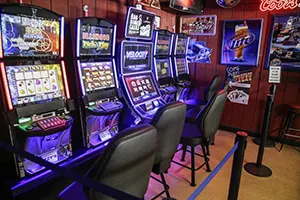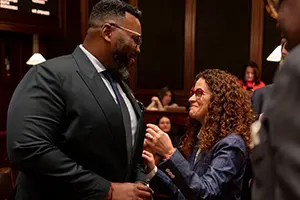 Democratic State Representative Kam Buckner has put forward an Illinois House proposal that describes legalized video gambling as a potential revenue stream for Chicago Mayor Brandon Johnson’s over $16.7 billion budget for 2024. As reported by the Chicago Tribune newspaper, the proposal is centered around the racial disparities that can be observed when it comes to Chicago’s gambling market. To tackle this issue, Mr. Buckner advocates for the creation of a licensing system that would allow gas stations and other eligible establishments to offer their clients entertainment via sweepstakes machines.
Democratic State Representative Kam Buckner has put forward an Illinois House proposal that describes legalized video gambling as a potential revenue stream for Chicago Mayor Brandon Johnson’s over $16.7 billion budget for 2024. As reported by the Chicago Tribune newspaper, the proposal is centered around the racial disparities that can be observed when it comes to Chicago’s gambling market. To tackle this issue, Mr. Buckner advocates for the creation of a licensing system that would allow gas stations and other eligible establishments to offer their clients entertainment via sweepstakes machines.
Sweepstakes machines, also known as video gaming terminals (VGTs), have been a point of contention in Illinois in terms of legality. Their resemblance to traditional slots and video poker machines is notable in both appearance and gameplay, yet their reward system, which typically includes non-monetary prizes, complicates matters. Another factor that plays a role in their dubious legality is the support of no-cost gameplay.
Illinois’ neighboring states have taken contrasting approaches toward these machines within their own jurisdictions. In Missouri, video gaming terminals have been legal for quite some time now, and the same can be said about the sweepstakes machines operated in Iowa. Indiana’s regulators, on the other hand, were quick to ban VGTs when they began appearing across the state over a decade ago. A proposal to lift this prohibition was made in 2023, but it seems regulators’ stance on the matter has not truly changed as the bill failed to come into effect.
The Issue of Current Illicit Gambling Transgressions
 Although sweepstakes machines are, at present, considered to be against Illinois’ gambling laws according to the state’s gambling regulator, they are a common sight in Chicago-based business establishments that can serve alcohol. No serious state-wide action to tackle these machines has been undertaken either. The most recent effort, a 2023 proposal by the Senate to officially prohibit VGTs, remains in legislative limbo after being voted on, approved, and subsequently abandoned.
Although sweepstakes machines are, at present, considered to be against Illinois’ gambling laws according to the state’s gambling regulator, they are a common sight in Chicago-based business establishments that can serve alcohol. No serious state-wide action to tackle these machines has been undertaken either. The most recent effort, a 2023 proposal by the Senate to officially prohibit VGTs, remains in legislative limbo after being voted on, approved, and subsequently abandoned.
Mr. Buckner is calling for these machines to be legalized and regulated in Chicago. He did, however, emphasize that for this to happen, businesses that presently include VGTs within their premises must not be excluded from being able to apply for and receive a license. This condition is directly tied to concerns that establishments owned by minorities would face severe financial consequences should they no longer be able to operate sweepstakes machines.
The Illinois Gaming Board (IGB) is less enthusiastic about the proposal. Elizabeth Kaufman, Director of Communications for the IGB, claimed no ethnicity data is tracked when it comes to licensing, and she later expressed that the proposal failed to “adequately address” the illegal operation of unlicensed sweepstakes machines. She further stressed that tackling all forms of illegal gambling has been “a longtime IGB priority.”
William Hall, subcommittee Chair of Chicago’s 6th Ward, expressed similar concerns but did previously clarify that there is a necessity for all potential revenue streams to be examined. He continued, saying that “room must be made” for voices and opinions, and that best practices would need to be taken into consideration. According to a spokesman of the mayor, Mr. Johnson “has not taken a position” on the potential regulation of video gambling.